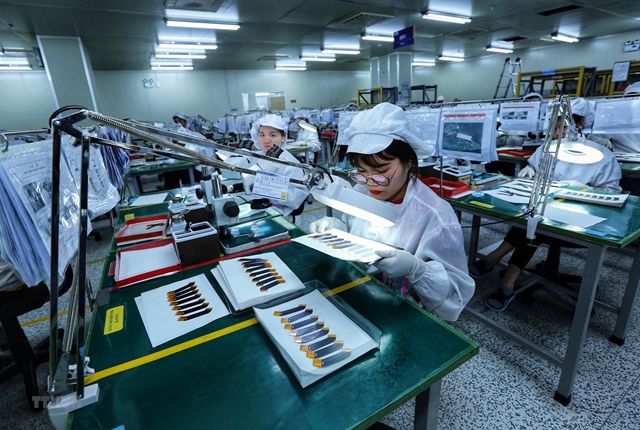 Economy
Economy


|
| A Korean electronics company in Yên Phong Industrial Park, Bắc Ninh Province.Việt Nam has significant opportunities to receive foreign investment in the electronics industry — VNA/VNS Photo Danh Lam |
HÀ NỘI — Việt Nam needs policies to enable the electronics industry to ready its supply chain as the country becomes ever more attractive for investment, Deputy Director of the Industry Agency under the Ministry of Industry and Trade Phạm Tuấn Anh said.
Anh said at a CEO forum on Tuesday in Hà Nội that Việt Nam’s electronic industry has an excellent opportunity to capitalise on the wave of supply chain restructuring after the COVID-19 pandemic.
Việt Nam’s advantages came from the Government’s effort to put the COVID-19 pandemic under control, recover production and business and accelerate economic growth, Anh said, adding that the Southeast Asian country was considered a safe and attractive destination for the global supply chains.
Currently, Việt Nam’s position in the international arena is also being enhanced as the country actively pushes up external economic activities by participating in several new-generation free trade agreements. This contributes to attracting interest and strengthening the confidence of foreign investors.
In addition, Việt Nam also had an advantage in human resources and a domestic market of around 100 million people with a rapidly increasing middle class which created a market with tremendous purchasing power, he said.
Looking at the development of Việt Nam’s electronic industry, Anh said that electronic companies in Việt Nam were now capable of producing essential electronic products. However, the development of the domestic electronic industry was mainly promoted by investments from multinational corporations in recent years, including the Republic of Korea and Japan.
He cited statistics that the export of phones and components reached US$57.54 billion in 2021, up by 12.4 per cent over 2020, while computers, electronic products and components brought an export revenue of nearly $51 billion, up 14 per cent. In addition, the industrial production index of the electronic industry rose 9.6 per cent in 2021.
The electronic industry grew at an average of 23.8 per cent in the 2016-20 period to make Việt Nam the 12nd largest electronic product exporter in the world and third in ASEAN.
However, he noted that around 90 per cent of the export revenue came from foreign direct investment (FDI) producers.
Việt Nam’s electronics companies mainly participated in the assembly stage in the supply chain while the local procurement rates remained low. In addition, the capacity of domestic electronics producers remained limited. As a result, some well-known domestic electronics brands slowed down significantly and held a very modest market share.
While some domestic companies participated in the supply chain, most provided simple products with meagre added value and technology content.
According to Nguyễn Mại, President of the Việt Nam Association of Foreign Invested Enterprises, the electronics industry was one of the industries promising to receive the investment shift.
Việt Nam was an attractive destination for investment, and it was necessary for Việt Nam to raise solutions to grab the opportunities arising from the production shift to participate in the global supply chains and enhance the production capacity, Mại stressed.
Recently, several multinational corporations such as Intel, Pegatron and Wiltron expressed their interests and intentions to invest in or expand electronics production in Việt Nam. In addition, some, such as Samsung, were also looking to increase the connection with domestic suppliers to strengthen their value chain in Việt Nam.
Nguyễn Phước Hải, General Secretary of the Việt Nam Electronic Industries Association, said that the shift of the supply chains of the electronics industry away from China was taking place stronger than ever, and huge opportunities were opening up for the domestic electronics industry.
Mại said Việt Nam needed to raise solutions to tackle the existing bottlenecks in FDI attraction to realise the opportunities.
The focus should be placed on improving the legal framework and introducing appropriate preferential policies to encourage FDI enterprises to establish linkage with domestic firms and develop human resources with skills and knowledge meeting the requirements of FDI.
According to Anh, support policies for the electronics industry should be more focused, adding that some were not strong enough.
VIệt Nam also needs to pay attention to promoting the formation of research and development centres to encourage innovations and develop an electronics industry with high added value. — VNS




